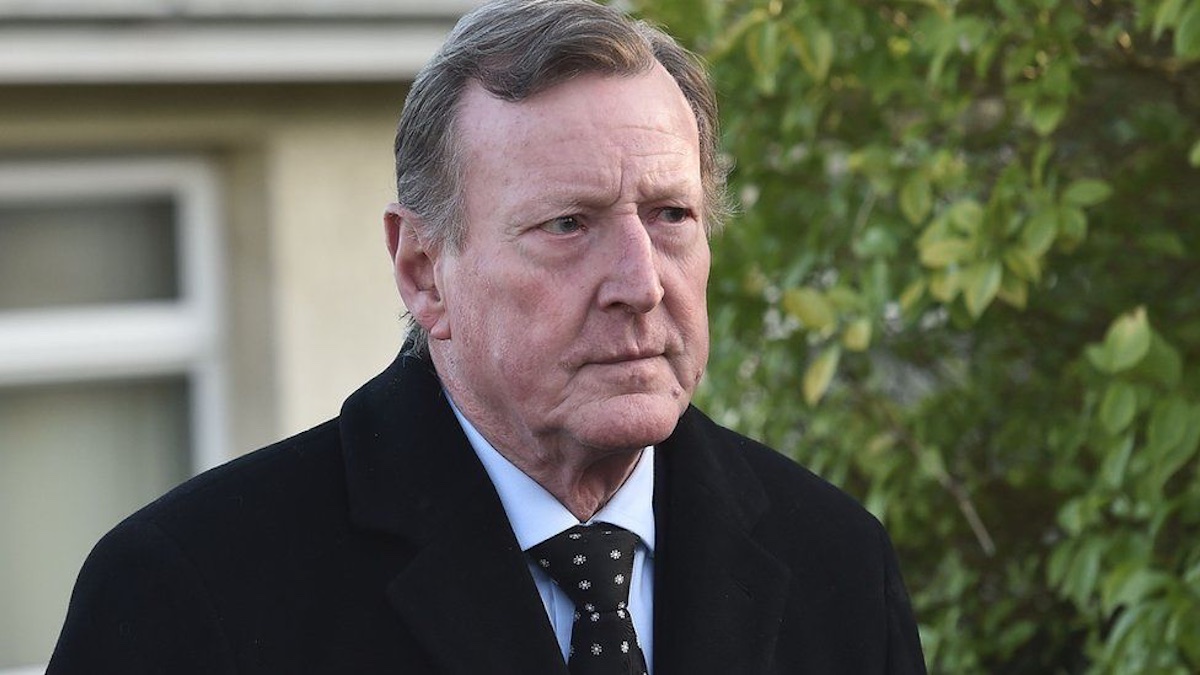
Although widely praised for his role in the 1998 Good Friday Agreement, former Ulster Unionist leader David Trimble will also be remembered for his failure to deliver the leadership unionism needed in the years following its signing.
Despite international tributes since his passing on Monday at the age of 77, David Trimble always had an ambivalent relationship with his image as a peacemaker.
A ‘moderate’ when it suited, Trimble’s mask would slip frequently, most famously in 1995 when he and DUP leader Ian Paisley walked triumphantly hand-in-hand along a section of the Catholic Garvaghy Road in Portadown, after a deal had been agreed to allow an anti-Catholic parade there.
The most reluctant participant in the peace process, he particularly resisted efforts to compare him to South African peacemaker FW de Klerk. After winning the 1998 Nobel peace prize alongside the late SDLP leader John Hume, he suggested the peace prize was a plot to encourage him to make concessions in the peace process.
Known for his signature red-faced intransigence, his refusal to share power with Sinn Féin contributed to the first and most damaging collapse of the North’s new political institutions in 2000 after just 72 days of operation.
Without a genuine defence of the Good Friday Agreement by the British government of the day, the UUP became increasingly rudderless and were displaced as the largest unionist party by the DUP in the Westminster elections of 2005. In a disastrous election result, Trimble lost his seat in Upper Bann and was forced to resign the UUP leadership.
His defeat cleared the way for a process of British appeasement of unionist demands to begin in earnest. Against the wishes of the Irish people, a renegotiation of the Good Friday Agreement took place in 2006, setting in train the strategy of undermining and rewriting the peace deal which continues to this day.
Handed a peerage in 2006 as compensation, Trimble joined the Conservative Party in the House of Lords where continued to support hardline unionist positions, including a hard Brexit and a remilitarisation of the north of Ireland.
This week former US President Bill Clinton said his “lifetime of service” helped bring peace to the North. Former British prime minister John Major praised his “critical” contribution to peace building, while former Irish Taoiseach Bertie Ahern described him as a “courageous” leader.
Former Sinn Féin leader Gerry Adams said David Trimble’s contribution to the Good Friday Agreement, and to the quarter century of relative peace that followed, could not be underestimated.
“David faced huge challenges when he led the Ulster Unionist Party in the Good Friday Agreement negotiations and persuaded his party to sign on for it. It is to his credit that he supported that Agreement. I thank him for that.”
Jeffrey Donaldson, who famously betrayed Trimble when he resigned from the UUP in 2003 and joined the DUP, paid his own tribute to his former leader. He described Trimble as a “titan of unionism” and said he never doubted Trimble’s commitment to “making Northern Ireland work”.
“Despite our differences, David’s objective was to deliver political stability in Northern Ireland and he believed in doing so to preserve and protect the union.”
Sinn Féin Speaker Alex Maskey said all the main parties agreed “it would be inappropriate” to hold a recall of the Assembly next week as requested by the SDLP.
The Stormont Assembly has not been sitting because the DUP is still refusing to re-enter power sharing amid its protest over Brexit.
“It is important that the Assembly formally expresses its condolences upon the loss of Lord Trimble, the first first minister of this assembly and it is only right that this should take place in the Assembly chamber,” Mr Maskey said.
A planned recall of the Assembly, due to take place this week, was postponed until after the tributes to the late UUP leader next Tuesday.
![[Irish Republican News]](https://republican-news.org/graphics/title_gifs/rn.gif)
![[Irish Republican News]](https://republican-news.org/graphics/title_gifs/harp.gif)

